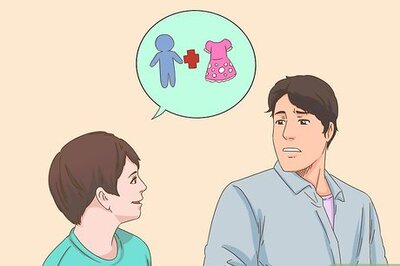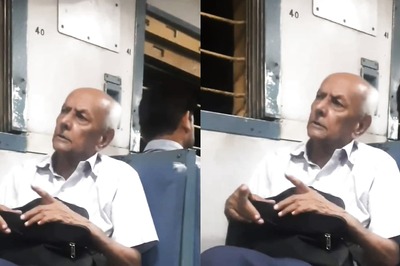
views
New York: The US death toll from the coronavirus has climbed past 3,600, eclipsing China's official count, as hard-hit New York City rushed to bring in more medical professionals and ambulances and parked refrigerated morgue trucks on the streets to collect the dead.
To put it in perspective, 2,996 US citizens died in the September 11 attack in 2001; about 600 lives less than what coronavirus has claimed in the hard-hit country.
The crisis hit close to home for Governor Andrew Cuomo, who reported teary-eyed that his brother, CNN anchor Chris Cuomo, was infected.
The governor pronounced on Tuesday the disaster unlike any other the city has weathered: "This is ongoing and the duration itself is debilitating and exhausting and depressing."
Elsewhere around the world, hard-hit Italy reported that the infection rate appears to be levelling off and new cases could start declining, but that the crisis is far from over. Spain struggled to fend off the collapse of its hospital system.
Vladimir Putin's Russia moved to crack down on quarantine violations and fake news about the outbreak. And China edged closer to normal as stores in the epicenter city of Wuhan began reopening.
Worldwide, more than 800,000 people have been infected and over 40,000 have died, according to a tally kept by Johns Hopkins University. Italy and Spain accounted for half the deaths, while the US had over 180,000 infections, with more dead than China's official toll of about 3,300.
New York was the nation's deadliest hot spot, with about 1,550 deaths statewide, most of them in New York City, which braced for things to get much worse in the coming weeks.
At Elmhurst Hospital in Queens, critically ill COVID-19 patients are filling intensive care units, surgical floors and operating rooms and waiting in the emergency room for beds to become available, said Dr Eric Wei of the city's hospital agency.
"I've practiced emergency medicine for a long time, and I'm seeing things that I never could have imagined in terms of the things this virus can do to all ages, including people who were previously healthy, he said.
A 1,000-bed emergency hospital set up at the mammoth Javits Convention Center began taking non-coronavirus patients to help relieve the city's overwhelmed health system. A Navy hospital ship with 1,000 beds that arrived on Monday was expected to begin accepting patients on Tuesday.
The indoor tennis center that is the site of the US Open tournament is being turned into a hospital as well.
The city also worked to bring in 250 out-of-town ambulances and 500 paramedics to deal with a crush of emergency calls. The fire commissioner said ambulances are responding to double their normal daily total of 3,000 calls to 911.
A five-day stretch last week was the busiest in the history of the city's emergency services operation.
In addition, New York authorities sought to bring on more volunteer health care professionals and hoped to have them on board by Thursday. Nearly 80,000 former nurses, doctors and others are said to be stepping forward, and the governor said officials are doing background checks for disciplinary actions and otherwise making sure they are fit for duty.
Around the city, workers in protective gear have been seen putting bodies of victims into refrigerated trailers. At some hospitals, like Lenox Hill in Manhattan, the trucks are parked on city streets, along sidewalks and in front of apartments. Cars and buses passed by as corpses were loaded by forklift at Brooklyn Hospital Center. People captured some of the scenes by cellphone.
As for Chris Cuomo, the 49-year-old TV newsman tweeted that he has suffered from fever, chills and shortness of breath and will be doing his shows from his basement, where he has quarantined himself.
"Luckily we caught it early enough," the governor said. "But it's my family, it's your family, it's all of our families. But this virus is that insidious, and we must keep that all in mind.
Figures on deaths and infections around the world are supplied by government health authorities and compiled by Johns Hopkins.
But the numbers are regarded with skepticism by public health experts because of different counting practices, a lack of testing in places, the numerous mild cases that have been missed, and perhaps government efforts to downplay the severity of the crisis.
For example, in Italy, where the death toll was put at about 12,400, the country's emergency coordinator, Domenico Arcuri, acknowledged that officials don't have a handle on how many people are dying at home or in nursing homes.
Still, there was a glimmer of hope there: Dr. Silvio Brusaferro, head of Italy's institutes of health, said that three weeks into a nationwide lockdown, the hardest-hit country in Europe is seeing the rate of new infections level off.
The curve suggests we are at the plateau," he said. But "arriving at the plateau doesn't mean we have conquered the peak and we're done. It means now we should start to see the decline if we continue to place maximum attention on what we do every day.
With the country's health care system buckling under the pressure, a field hospital, built in just 10 days, was unveiled at the Milan fairgrounds.
We made a promise and we kept it,said the head of the project, former civil protection chief Guido Bertolaso, who ended up catching the virus while on the job and had to work from his hospital bed.




















Comments
0 comment